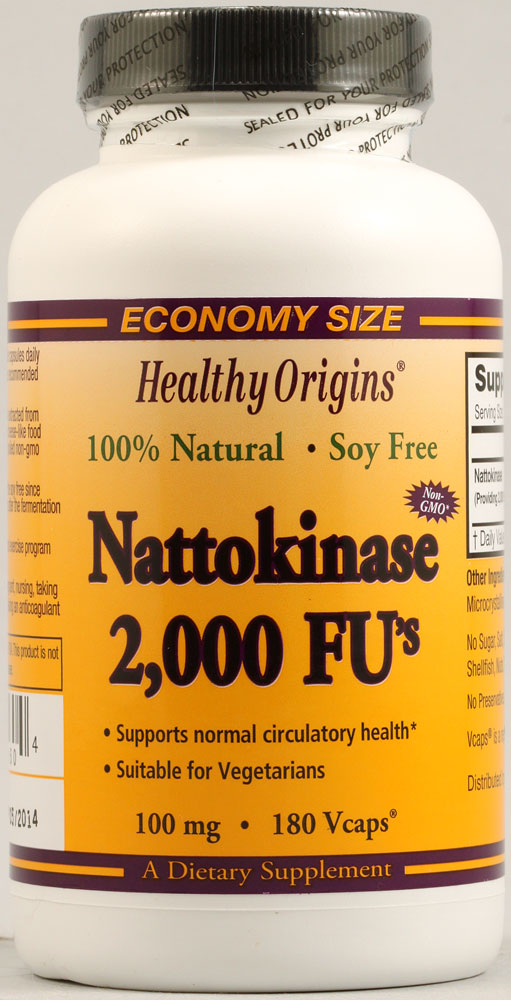In 1980, Doctor Hiroyuki Sumi was in the middle of searching for a natural agent that had thrombolytic effects (able to break up blood clots). The enzyme he was looking for would be able to dissolve the clots associated with heart attacks
and stroke. After testing over 100 natural foods as potential “clot busters”, Dr Sumi accidentally found what he was looking for when Natto was dropped onto artificial thrombus (fibrin) in a Petri dish. The thrombus around the Natto dissolved gradually and had completely dissolved within 18 hours. Dr Sumi named the newly discovered enzyme “nattokinase”, which means “enzyme in natto”.
In order to understand the importance of this discovery, let’s go back to biology class for a second. Blood clots form when strands of protein called fibrin accumulate in a blood vessel. In the heart, blood clots cause blockage of blood flow to muscle tissue. If blood flow is blocked, the oxygen supply to that tissue is cut off and it eventually dies. This can result in angina and heart attacks. Clots in chambers of the heart can mobilize to the brain. In the brain, blood clots also block blood and oxygen from reaching necessary areas, which can result in senility and/or stroke.
For many, Nattokinase may be the biggest discovery for natural approaches to cardiovascular health. But what is Nattokinase? Nattokinase is a potent fibrinolytic (breaks down fibrin) enzyme extracted and purified from a traditional Japanese food called Natto. Natto is a cheese-like food and is produced by a specific fermentation process of soybeans. Natto has been used in Japan for over 1,000 years for cardiovascular support and to lower blood pressure. Natto is the only preparation that contains the remarkable nattokinase enzyme with fibrin-dissolving properties.
Why is Nattokinase so important? The enzyme is capable of breaking down and dissolving blood clots formed in a vessel or heart chamber and can enhance the body’s natural ability to fight clotting of the blood. Unlike the class of medications called antithrombin, Nattokinase produces a prolonged action (lasting from 8 – 12 hours) in preventing coagulation of blood and dissolving existing clots.
As a pharmacist and ND, I think that this discovery is and should be considered a major discovery for those concerned with cardiovascular health issues and general overall health. I come from a family history of cardiovascular disease and have started using Nattokinase personally to help prevent circulatory episodes in the future.
Beyond the more obvious uses mentioned above, Nattokinase has shown to provide other health benefits. Here is a small list of some of the other potential health benefits of Nattokinase:
- Hemorrhoids and varicose veins
- Senile dementia
- Diabetes (caused by pancreatic dysfunction)
- Fibromyalgia
- Muscle spasms
- Poor healing
- Chronic inflammation
I believe in using Nattokinase in combination with other enzymes. I believe in using balance and enzymes are no exception to this philosophy. Enzymes support many different facets of health and in this case, Nattokinase is the one to use for cardiovascular health. Regretfully, for those of us who are healthy, it is hard to notice any changes, but with the science behind Nattokinase, you can get piece of mind knowing that you are doing something proactive to help your cardiovascular health.
Nattokinase is extremely important for circulation and circulatory disorders. If you look at the physiology of the body and understand how Nattokinase works, you can easily understand why this may be a supplement that even the healthiest of people would want to use.
Finally, the one concern many natural health enthusiasts have is about safety. When looking for a quality Nattokinase, you need to look for one with the vitamin K removed. Natto contains the highest concentration of Vitamin K known in food. Significant amounts of Vitamin K2 are produced during the fermentation process of Nattokinase. By removing most or all of the Vitamin K2 you will eliminate any potential adverse drug interactions with warfarin (Coumadin®), a Vitamin K antagonist pharmacological agent typically used an anticoagulant.

